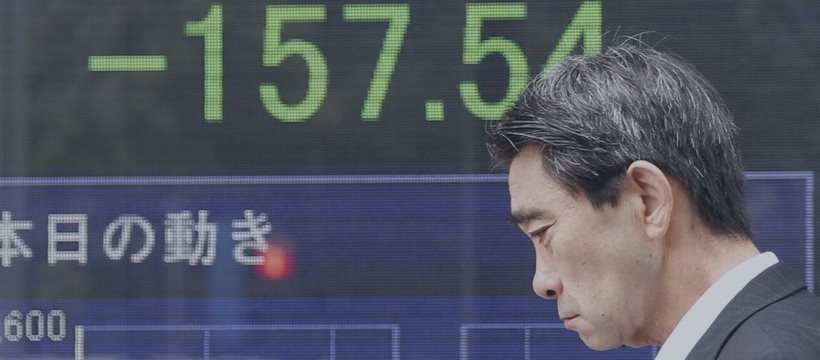
Asian shares dropped with U.S. index futures
as the surprising move from Switzerland abandoning the franc’s cap
extended into a second day.
“The SNB caught almost everyone by surprise and it’s
creating unease and anxiety in markets,” Nader Naeimi, who
helps manage about $125 billion as Sydney-based head of dynamic
asset allocation at AMP Capital Investors, said by phone.
“The strategy is capital preservation for now, buying gold to hedge against the volatility which is going to continue.”
Gold traded near a four-month high and sovereign bonds rose, as Bloomberg reports.
The MSCI Asia Pacific Index fell 0.5 percent by 3:20 p.m.
in Tokyo, while Standard & Poor’s 500 Index futures slid 0.7
percent following a five-day drop. The franc was near parity
with the euro after trading at 1.20096 per euro immediately
before the Swiss National Bank announcement. Yields on 10-year
Australian and Japanese debt declined to records. Copper is
heading for its biggest weekly loss in three years, while oil is
set for the longest weekly losing streak since 1986.
Japan’s Topix index fell 0.9 percent, capping a 1.2 percent drop in the week.
The Kospi index in Seoul retreated 1.4
percent. Hong Kong’s Hang Seng Index slid 0.6 percent and the
Hang Seng China Enterprises Index was 0.5 percent lower.
The Swiss Market Index slumped 8.7 percent Thursday, its biggest one-day drop since 1989.
The SNB action increased speculation that the European Central Bank may unveil a broader program of stimulus when it meets next week. The SNB also deepened negative deposit rates, underscoring Europe’s divergence with the U.S., where the Federal Reserve is mulling rate rises.
The
largest U.S. retail foreign-exchange brokerage FXCM Inc. said it may have
breached some capital requirements after clients got caught out
by the franc surge, while a New Zealand currency brokerage said
it would close due to losses. The euro area reports final
December consumer prices figures today.
Auckland-based Global Brokers NZ Ltd. said in a statement on its website that the majority of clients were on the “losing side” of the franc position, suffering greater losses than their account equity. Swissquote Group Holding SA, a Swiss provider of online banking and trading services, said in a statement that it activated a 25 million franc provision after the SNB’s move created negative cash balances for clients.
Gold slipped 0.4 percent to $1,257.46 an ounce on the spot market today. It jumped 2.8 percent last session in its steepest one-day climb since Dec. 1.
Australia’s 10-year notes paid 2.55 percent after the yield dropped to a record 2.49 percent, below the central bank’s official cash rate for the first time since 2012. The yield on Japanese government bonds due in a decade fell to as low as 0.225 percent, also the lowest ever.
U.S. 10-year Treasuries were little changed, with the yield at 1.72 percent. The rate fell for a fifth straight day yesterday and touched 1.70 percent, the lowest since May 2013.
The franc’s surge versus the euro ranked as one of the biggest moves among major currencies since the collapse of the Bretton Woods system in 1971. The Swiss currency reached 85.172 centimes per euro last session, its strongest level since the euro’s 1999 debut and climbed against all of its major and emerging-market counterparts. It fell 4.2 percent to $1.1431 today.
The euro was little changed at $1.1630 after falling 1.3 percent yesterday. The 19-nation currency is headed for a fifth weekly drop, down 1.8 percent versus the greenback. The euro bought 1.01762 Swiss francs and 135.80 yen.
The Bloomberg Dollar Spot Index, which tracks the U.S. currency against 10 major peers, was set for its first weekly decline since the five days ended December 12. The yen was 0.5 percent weaker at 116.76 a dollar, gaining 1.5 percent this week for the best performance among 11 Asian currencies tracked by Bloomberg. The South Korean won jumped 0.5 percent versus the dollar today.
West Texas Intermediate crude fluctuated on its way toward an eighth weekly retreat as a global supply glut shows no sign of abating. The February contract was trading at $46.60 a barrel. Brent crude added 0.4 percent to $48.44 a barrel in London.
Demand for oil from the Organization of Petroleum Exporting Countries will average 28.8 million barrels a day, about 100,000 barrels less than estimated last month, the Vienna-based group said in a monthly report on Thursday.
Copper for three-month delivery on the London Metal Exchange rose 0.4 percent to $5,649.75 a tonne. The metal has lost about 7 percent this week, the biggest such retreat since September 2011.
Futures on the Nasdaq 100 Index declined 0.9 percent.
Intel Corp., the chipmaker with the third-highest weighting on the stock gauge, projected sales that may fall short of analysts’ estimates.


